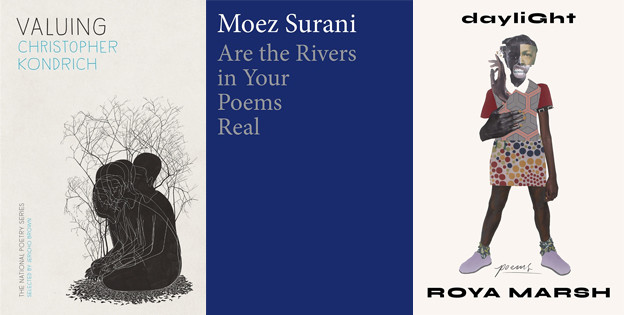
Truth and revolution
Gabriela Portillo Alvarado

Editorial assistant Gabriela Portillo Alvarado makes their capsule reviews debut with writing on three poetry titles featuring love, resistance, and truth.
Valuing, Christopher Kondrich (The University of Georgia Press, 2019)
Valuing’s perhaps most prominent feature is romantic tenderness: “And though I have no holdings, / you may increase your stock in me; / you may reserve the right to vessel. To partition if you need to.” Through often-abstract wordplay, which rises to the surface of every page, Kondrich reveals his love of and mastery over language. But beneath this lies an undercurrent of vivid and striking rawness: “I survive the loosely knitted only to stop at the tightly wound, / beyond which I survive myself solid again.” This undercurrent sometimes turns perilous, whisking the reader into and out of different depths of understanding.
Are the Rivers in Your Poems Real, Moez Surani (Book*hug Press, 2019)
Are the Rivers in Your Poems Real focuses on a variety of subjects from daily commute to relationships, from travels in India to New York Times references. Surani delves into his experiences with romantic love: “When we aren’t lured by mystery we’ll seek it in others. […] / Is love simply chasing after another’s full and elusive truth?” Abstract poetic images, maps, and even paintings of words populate this volume; some poems are lists of dates, times, phone numbers. But at the end of his collection, Surani moves away from this metaphysical concentration via criticism — his final poem concludes with a call to writers: “Leave aside what’s rhetorical / and metaphoric / and settle for nothing / until the vectors of power are even.”
dayliGht, Roya Marsh (Farrar, Straus, and Giroux, 2020)
Marsh digs and digs at her trauma to discover a raw truthfulness that permeates her poems. dayliGht’s experimental style serves only to heighten the accessibility of Marsh’s message — focused on the intersectionality of her Black, female, lesbian, and survivor identities — and her revolutionary eye is epitomized in the first and last pages of her volume, which each contain a single word: on the first page, “BLACK,” and on the last, “DYKE.” Marsh’s inspirational confidence and stability in her identity shows in her range of poetic styles, from classic to erasure, from found to prose.